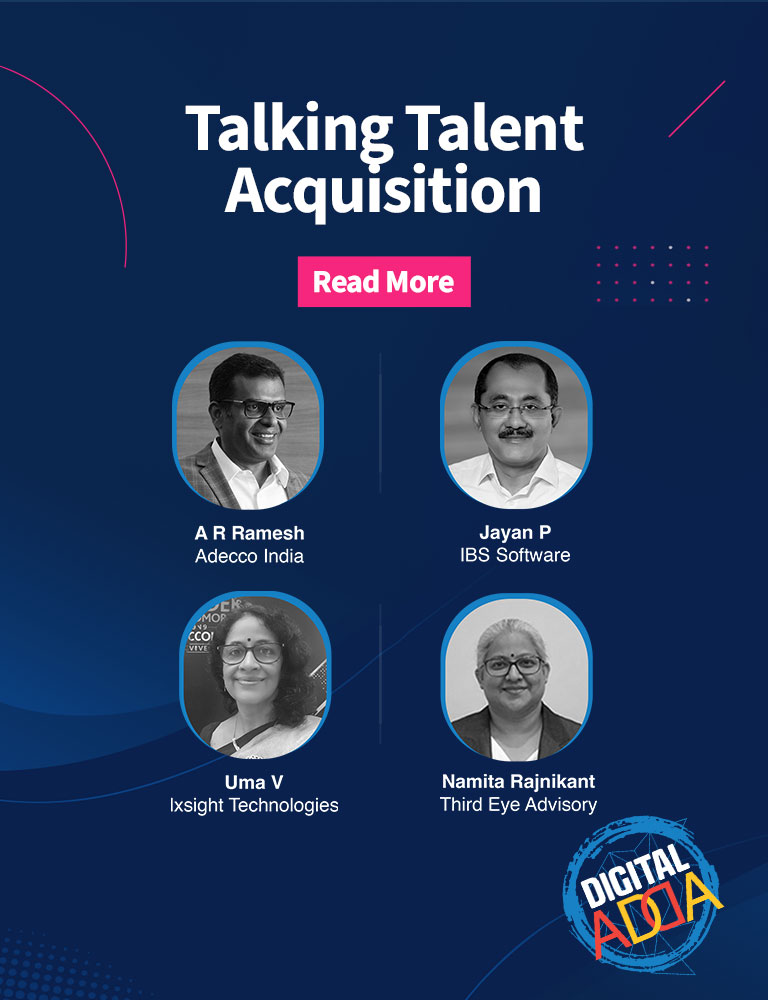Digital Adda: Talking Talent Aquisition
- Emerging Technology
- Professional Skills
The more we give importance to skill development, the more competent will be our youth
-PM Narendra Modi

Tech skills have gained prominence across all domains in the last two years. With work and to some extent even life moving from physical to virtual domain, demand for digital tech increased exponentially and hence the digital tech talent too. By 2026, the demand supply gap for Digital Tech Talent is expected to increase 3.5 times to 1.4M-1.8M. One of the biggest tasks before any growing organization aspiring to make a digital transformation or support its customers in their journey is acquiring the right skilled talent.
To explore the challenges faced by the industry in this critical area, NASSCOM FutureSkills Prime hosted a round table which we call Digital Adda on the topic “Talking Talent Acquisition”. The session was moderated by Smitha Kumaran, Learner success - Lead, FutureSkills Prime.
In demand skills - What are employers looking for?
Employers are looking for a skill mix and not just one skill. Relevance of core tech skills remains. A R Ramesh, Director -Digital Business and Professional Staffing solutions, Adecco India, said that it helps if along with core tech skills like Java, candidates have complementary skills for e.g. Angular, Full stack, UI/UX etc. While technology keeps evolving, if the foundation is strong, it is easier to adapt to and learn newer technologies faster. Core technologies have not changed. Candidates still need to know their C++, Dotnet, Java etc; just that this would help in picking adjacent skills when business need arises.
The Big Reveal:
How do organizations determine the right skills to hire considering the shorter shelf life of skills, how do they assess candidates, have different employment models come up in the wake of changing human dynamics post pandemic. These and more questions were explored.
With hyper automation making its entry in the hugely human centric area of hiring, having templatized job descriptions/ competency standards would help in automating many of the labor-intensive processes. A standardized skill taxonomy and allied certifications can make the initial filtering process smoother and standardized. As the industry is getting ready to move from degrees to skill-based hiring and compensation, standardization can help make this transition quicker.
Funded by MeitY (Ministry of Electronics and Information Technology) and jointly executed by NASSCOM, FutureSkills Prime platform offers courses in emerging technologies aligned to National Occupational Standards (NOS - is the common language to measure Competency standards). In India these standards were benchmarked across the Competency Standards developed in US, Canada, EU and UK. The competencies and job roles are defined by the industry representatives and vetted by experts. This platform could become the corner stone in creating standardization and the single source of truth for all Indian IT participant skill passports.
Certifications vs Degrees:
Uma Venkataraman, CEO, Ixsight Technologies, shared her thoughts on the selection process. Candidates are expected to demonstrate what they have learnt. They are asked to provide hands-on solutions to simple problems. Ixsight Technologies uses hackathons and online proctored tests for hiring; the organization had great success with FutureSkills Prime Career Fair also. With fast changing technology, interviewers are judging candidates o their learnability, and hunger and passion to learn. Uma also mentioned that they have done away with filter of cut-off marks in an effort to go beyond degrees. According to A R Ramesh, one way to demonstrate skills is by getting standardized certificates in tech courses.
Secret Sauce
Employers today are looking for a balance between tech skills and professional skills. Namita Rajnikant, Director- Third Eye Advisory, shared that soft skills like Innovation and Design thinking, analytical skills to be able to look at data and make a judgement call, complex problem solving skills, people skills are much in demand. Jayan P, Head of Global Human Resource, IBS Software, opined that with hybrid work environment becoming the norm, the ability to be self-motivated is a key differentiating factor. A high degree of proactiveness is required especially as organizations shift to more remote work. The ability to work in a team, spirit of collaboration, effective communication, self-motivation – a mix of these skills along with tech skills is the secret sauce which employers are looking for.
Gig economy
Demand for niche and complex technical skills has led to a ripple effect on gig economy or contract economy. Although in pockets, there are examples where both employers and employees are willing to work on project/task outcome basis. There are examples of skilled students who have turned entrepreneurs. Namita gave the example of a person who worked on motorcycle design for one company and on the shopfloor for another. Strong policy and processes could make this a preferred employment model for many niche skills.

Reskilling
Speaking about the tech talent demand supply gap, Namita highlighted the need for reskilling workforce. According to NASSCOM’s India’s Tech Industry Talent: Demand Supply Analysis report, India needs to reskill its Core Tech talent into Digital Talent roles to build a resilient workforce for the decade. India’s core tech work force reskilling pace has to increase to bridge the gap. The FutureSkills Prime platform is a tool available for reskilling existing employees as well as skilling fresh talent. The platform offers a variety of courses including Foundation courses, Deep skilling Courses, Bridge Courses, Courses on Popular Tech Topics and Professional Skills, Programming languages and Virtual Labs etc. Through this platform, learners can exit at multiple points in their learning journey.
To view the complete session, click here: https://www.youtube.com/watch?v=7Jjcqg1e3d0&t=494s


